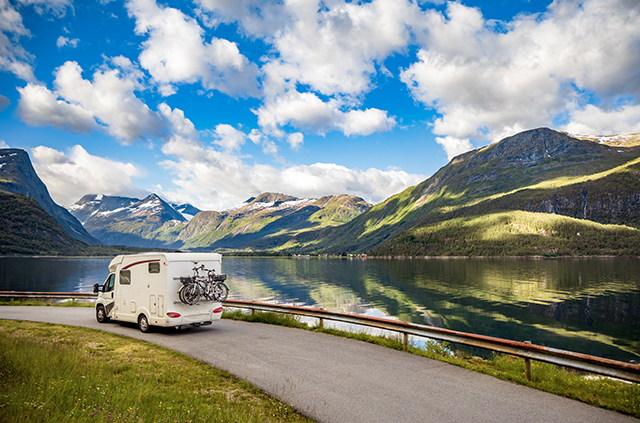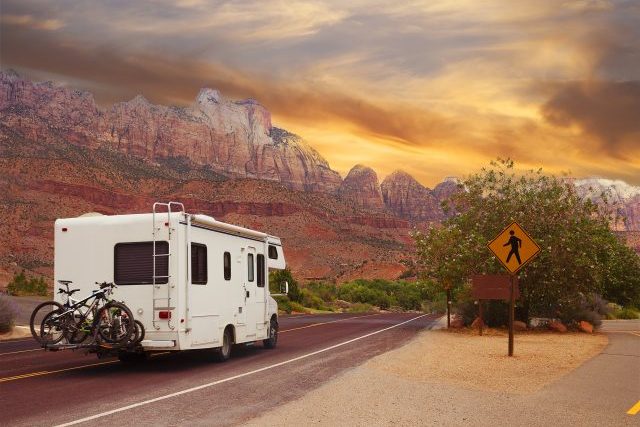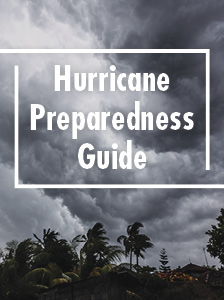RVing isn’t just a way to travel – it’s a lifestyle.
More than simply a mode of transportation, an RV is an all-in-one vacation mobile. It’s your hotel, restaurant and roaming office. It’s your home on the road.
Whether you’re interested in renting or buying an RV for the first time, or you can’t wait to get on the road again, these RV safety and insurance tips will make sure your journey is a smooth one.
If you daydream about cross-country road trips, camping at national parks or waking up in a new place every day, read our article about why you should take an RV road trip. It includes what to think about when planning, types of RVs and more.
RV Insurance
For those that own an RV, a specialty RV policy is recommended to properly cover your home on wheels. It also will provide you with a variety of options to customize to your needs.
Because an RV is like a car and a home, it includes some of the coverages of both auto and home insurance. Like car insurance, your RV insurance should have liability coverage for bodily injury and property damage. And like a home, you’ll want to discuss a total loss policy with your agent that covers replacement cost vs. actual cash value.
There are a few other factors to consider that could impact your RV coverage as well.
- Type of RV. RVs come in different sizes, styles and price points. They can be towable or drivable and can suit a variety of needs. Coverage varies for every type of RV.
- Renting. If renting an RV for pleasure, it’s smart to get extra coverage from the rental company. Similar to insurance when renting a car, the rental company’s insurance may cover what your personal insurance does not.
- How often will you use it? Some use their RV for road trips, while others use it as a full-time residence. Full-time RVers may need coverage more akin to a homeowners policy.
- What do you plan on keeping in there? You might have photography equipment or expensive camping supplies, or maybe you’ll be working from the road and bringing along your computer and other tech. Whatever personal property is in your RV, you’ll want to make sure it’s protected.
- Other policy options. Depending on your state and what is offered by your insurance carrier, there are a few other options you can discuss with your agent. Emergency expense coverage pays for items such as lodging and/or travel expense if your RV were to be damaged or destroyed by a covered loss. Vacation liability provides liability coverage when you are parked and using your RV at an RV site. RV policies may provide an option for 24-hour roadside assistance, but a AAA RV membership will also cover you.
Learn how you can protect your RV with specialty insurance through AAA.

RV Safety
Once you’re fully insured and you’ve found and booked the perfect campsite, it’s time to hit the road. Keep these RV safety basics in mind for your travels ahead.
Driving an RV Is Not Like Driving a Car
RVs are longer and heavier (some could be as big as buses) and have limited visibility. Some states require a special license to drive an RV, especially if it’s over a certain weight, but you don’t need one to drive most motorhomes, according to Outdoorsy.
If you’re new to RVing, you can benefit from taking a training course, like the one by the RV Safety & Education Foundation. Classes and workshops are often offered online and cover everything from RV weighing to tire safety.
For your first RV trip, try a destination that’s closer to home so you can get better acquainted with the vehicle. Practice makes perfect!
Maintenance
If you own an RV, you know they experience a good amount of wear and tear. After all, they drive for long distances and could stay parked for months at a time. Bring your RV to a trusted mechanic that specializes in RVs for regular checkups and stick to the maintenance schedule recommended by the manufacturer.
Tires are a big part of RV safety; a blowout could ruin your trip and spell disaster for both the vehicle and the precious cargo inside. You want to make sure the tires can handle the weight you are carrying and maintain and monitor the pressure. Consumer Reports also recommends replacing tires every 10 years from the date of manufacture, or sooner if noted in your owner’s manual.
Before Every Trip
Like any other road trip, you’ll want to make sure both you, your passengers and your vehicle are prepared. Give your RV a thorough safety check to get it ready for the road, map and price out your route for fuel and plan for emergencies. You’ll also want to secure down all the items in your RV before every trip to keep them from becoming hazardous projectiles while driving.
Try the 330 Rule
Many veteran RVers swear by this rule, which encourages drivers to stop driving once they’ve hit 330 miles or it’s 3:30 in the afternoon – whichever comes first. This ensures you’ll have enough time to explore your destination without being completely spent from too many hours behind the wheel, and that you’re totally alert while driving.
Other versions of this theory are known as the 3/3/3 rule (300 miles/stop every three hours/stay three nights) and 2/2/2 rule (200 miles/stop every two hours/stay two nights).
RV Security
While most campsites and RV parks are safe, you may want to invest in a security system to keep an eye on your RV. Easy-to-install security camera systems, as well as window and door alarms may help to give you added peace of mind while you’re sleeping and out exploring.
If you do experience a break-in, your RV insurance can cover you for the replacement cost of your items – in other words, the full cost to replace the item with one of similar kind and quality.
If you plan on using public Wi-Fi during your trip, you may also consider downloading a virtual private network or VPN on your devices, to keep your personal information safe.
Schedule an appointment with an insurance agent to learn more about protecting your RV with specialty insurance through AAA.
Tell us your best RV tips in the comment below.
One Thought on “RV Safety and Insurance Tips”
Leave A Comment
Comments are subject to moderation and may or may not be published at the editor’s discretion. Only comments that are relevant to the article and add value to the Your AAA community will be considered. Comments may be edited for clarity and length.


















Thank you for explaining that coverage will vary for all of the different kinds of RVs. We’re thinking about insuring our RV since we plan to use it so often. I’ll be sure to keep this in mind when getting quotes for it.